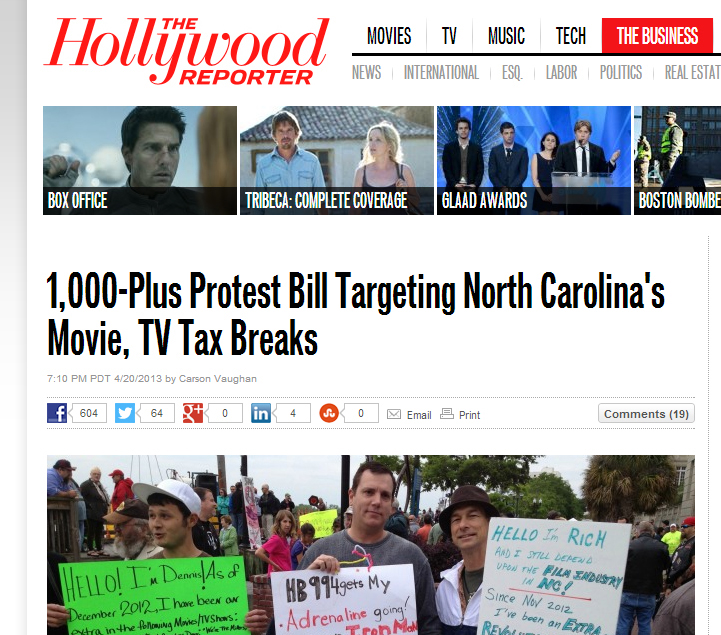
Screenshot of THR. Read the full article here.
North Carolina’s film industry was featured in The Hollywood Reporter last weekend in an article titled ‘1,000-Plus Protest Bill Targeting North Carolina’s Movie, TV Tax Breaks‘. It’s a great article. Go read it.
Folks were protesting in Wilmington, N.C., because of a bill that would change the state’s film tax incentives. I learned about the bill last week when the Star News published an article titled ‘Local film leaders say bill would end N.C. film industry‘. Go read that article, too. It explains the bill and how it would change the tax credit.
I’m fascinated by the tax incentives and the affect they have had on the N.C. film industry. The tax incentives have helped the state’s film industry grow a lot. The NC Film Office (NCFO) published significant, record-breaking numbers in a press release on March 26, 2013:
Over 20 productions have indicated they intend to film, or have already begun filming, in North Carolina, with a total direct in-state spend in excess of $138 million while creating more than 13,000 job opportunities, including 2,100 well-paying crew positions for the state’s highly skilled film professionals.
The end of that article attributes the successes to the tax incentives:
Much of the new-found success of the North Carolina film industry is directly attributed to the bi-partisan legislation in 2010 that created a 25 percent refundable tax credit for productions, based on their direct in-state spending on goods, services and labor. Productions must spend at least $250,000 to qualify for the tax credit, which is only given back to the production after they have completed their spending in the state and an audit has been completed on the project by the North Carolina Department of Revenue.
Most of my research, reading, and lengthy conversations have proven it to be true: the success of our state’s flourishing film industry can be attributed to the tax credit.
Then again, it’s also self-evident that a very competitive tax incentive is enticing. Making a film or television show is expensive, so finding savings — anywhere in a production budget — is important to the success of a project. It’s kind of obvious that a competitive tax incentive will bring a production to North Carolina.
How does this relate to me, an indie filmmaker?
My documentary and narrative films don’t qualify for the tax credits. The N.C. tax incentive requires minimum spending of $250k, and these small productions are no where close to that right now. But that may not always be the case. I want that incentive available when I finally get the budget big enough to qualify.
Looking at the bigger picture, I feel like the success of the film industry in the state directly affects me. I love calling North Carolina home. I enjoy having big, Hollywood productions so close by because it’s encouraging and exciting. There are more possibilities, opportunities, and potential if we have a flourishing film industry — on both the indie and professional levels. I feel like we’re all connected and so I want the state’s film industry to continue to succeed. It also makes me happy to see the state receive positive news coverage, increased film-related tourism, and more productions finding a home here. I’m a proud native of North Carolina and I love that others appreciate the state as much as I do.
From where I’m sitting, the N.C. film tax incentives seem like a no-brainer: a good thing that we should keep around as long as we can.
The proposed legislation has already touched a nerve, and most likely won’t carry on. But I’m glad to see that folks were protesting it last weekend. I wish I could have been there, too. I am also glad this is making news, especially considering how many folks were glued to coverage of the Boston marathon manhunt last week. (My deepest sympathies to those involved.)
You remember when I blogged about the non-existent N.C. film society? If such an organization existed, I bet we’d have the means to easily educate and empower North Carolina film and television professionals about something like this — so that we could mobilize quickly and easily. If something like that already exists, then clue me in, please? I want in.
I still have a lot to learn. Tell me what you think in the comments.
Want to learn more?
Here are some links to more information: